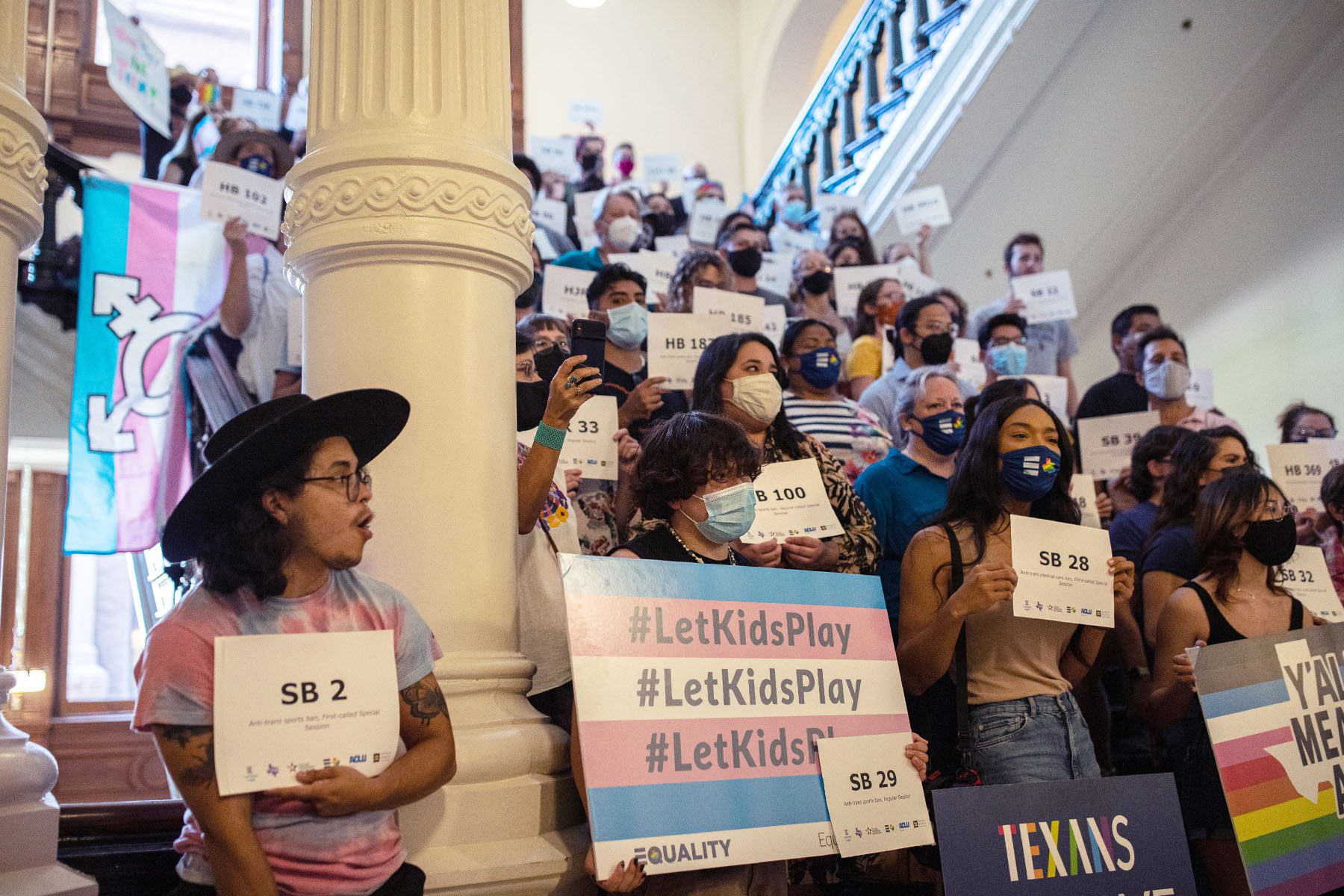Your trusted source for contextualizing LGBTQ+ and politics news. Sign up for our daily newsletter.
Transgender students and their parents expressed their fears, and hopes, about the current onslaught of anti-LGBTQ+ legislation to top officials at the Education Department in a closed-door meeting on Wednesday. The families, who traveled from Tennessee, Iowa, Texas, North Carolina and Missouri, said that they feel like they are being targeted by their state governments and local elected leaders — and are turning to President Joe Biden’s administration for help.
“I don’t really feel safe anymore. I used to feel safe,” said Maya, a 12-year-old trans girl who traveled to Washington D.C., from Texas with her mom for the meeting. The Education Department asked The 19th to identify the children and their parents by first names only because of the increasing level of harassment people are facing over transgender rights.
Maya said that she doesn’t feel safe at school — and feels like her state lawmakers don’t see her for who she is, even when she goes to the capitol to testify against anti-trans bills.
U.S. Deputy Secretary of Education Cindy Marten, who listened to families’ stories on Wednesday, told The 19th in an exclusive interview that the agency is working on upping its enforcement against state-level anti-LGBTQ+ legislation — and on encouraging families of transgender youth to file complaints with the agency’s office of civil rights. That office has seen a rise in complaints, she noted. Marten said the increase was good, albeit difficult, news since it means that more families are aware of what federal tools are available and are using them.
However, Maya’s mom, Lisa — who has been dealing with an onslaught of anti-LGBTQ+ legislation in Texas over several legislative sessions now — said that she doesn’t feel safe, and feels like she’s losing hope.
-
In Case You Missed It:
-
In Case You Missed It: 19 Minutes with The 19th: Trans Day of Visibility
“I want to believe they can actually help us. But it doesn’t feel that way,” Lisa told The 19th, shortly after the roundtable took place on Wednesday. “I really do believe that the Biden administration, that this entire department, cares for trans kids. It’s just that saying it, and then actually doing something [is different].” She said that her daughter is not able to join the school swim team that matches her gender identity. “Our Title IX rights are being violated.”
Catherine Lhamon, assistant secretary for the agency’s office for civil rights, responded to families’ concerns throughout the meeting and said that her office stands ready to investigate and enforce federal antidiscrimination mandates in any school. By law, transgender students cannot be exposed to a hostile school environment, she said.
“If what you’re experiencing makes you feel like you’re not safe at school, or you can’t feel comfortable at school . . . that’s something that my office can help with,” Lhamon said.
Berry, who traveled from Iowa with his mom to the meeting, said that they were bullied by a bunch of different kids last year after changing their name and pronouns. He was scared to go to school every day and reported the bullying three times at their principal’s office. More recently, Berry said other students had been addressing him by his deadname — the one they stopped using when they transitioned.
“I shouldn’t have to deal with kids who are trying to make me feel less than everyone else,” he said.
In Iowa, Gov. Kim Reynolds, a Republican, recently signed into law a gender-affirming care ban for minors as well as a bill regulating how trans students can use the bathroom. One currently advancing bill would prevent Iowa school districts from recognizing a student’s new name or pronouns after transitioning, unless that child obtains prior written consent from their parent.
“We have all kinds of these parental consent things that are forced outing for our kiddos,” Berry’s mom said during Wednesday’s meeting. Her family is seriously considering moving out of the country, she said — although Berry doesn’t want to leave their friends behind.
The Rev. Regina Clark, who traveled from Memphis, Tennessee, to join the meeting, said more action needs to be taken.
-
More LGBTQ+ coverage
- Exclusive: Democrats reintroduce federal Trans Bill of Rights as GOP tries to advance restrictions
- 2023 wave of bills is fueling a political ‘war against LGBTQ+ people,’ new report shows
- Trans youth in Florida can no longer start gender-affirming care, pushing families toward difficult decisions
“It’s my prayer that on the federal level, that you all will make it more known what your position is, so that when we’re in our communities, we’re not seen as these crazy folks,” said Clark, whose transgender child is now a college student. “So that we can stand up and help advocate knowing that the federal level says this, because they’re beating our families up. They’re beating us up.”
This year, lawmakers in Tennessee have passed legislation restricting public drag shows, banning the ability of trans youth to access gender-affirming care and rejecting federal funding for HIV treatment.
Marten has been holding roundtable discussions with teachers, parents and students in several states this year — so far, she has visited Arizona, Ohio, New York, Tennessee — as part of the agency’s campaign to promote academic excellence. Anti-trans policies have come up as part of those conversations, she said, and the agency responds by sharing ways for families to contact the agency’s office of civil rights.
“Somebody will bring up a law that is interrupting a student’s ability . . . when you have a ban like this, kids aren’t learning. And here’s where you can go if you’re seeing students being stopped from getting access to their education. These are the resources available to you at the federal level. We send them directly to our toolkits,” she said.
Marten said that students who joined the roundtable on Wednesday are “courageous” to share what they are going through. Education Secretary Miguel Cardona, who was unable to attend Wednesday’s roundtable due to leading a U.S. delegation in Zambia, said in a recorded video message played during the meeting that transgender and nonbinary students are facing hostility fueled by political attacks.
“This hostility is what follows when politicians are among those attempting to bully transgender students and their families and use state laws to limit who they can be in our school communities,” he said. Transgender students should be able to be unapologetically themselves at school, Cardona said — a message the agency wanted to send on Transgender Day of Visibility on Friday.
Emerson, a junior in high school who traveled to D.C. with his dad from North Carolina, told The 19th that it is important for people to know that transgender people are more than their identity. He wants to be a teacher, and is working to get his associate’s degree in political science through taking community college classes. But he’s still worried about his future, and what could happen in the current political climate.
“It’s really scary to be trans right now, with all the legislation that’s being passed,” they said.







